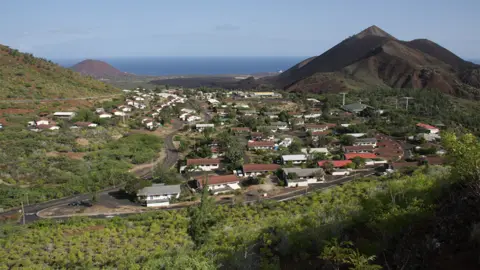Ascension Island: Priti Patel considered outpost for UK asylum centre location
 Getty Images
Getty ImagesThe government has considered building an asylum processing centre on a remote UK territory in the Atlantic Ocean.
The idea of "offshoring" people is being looked at but finding a suitable location would be key, a source said.
Home Secretary Priti Patel asked officials to look at asylum policies which had been successful in other countries, the BBC has been told.
The Financial Times says Ascension Island, more than 4,000 miles (6,000km) from the UK, was a suggested location.
The Foreign Office is understood to have carried out an assessment for Ascension - which included the practicalities of transferring migrants thousands of miles to the island - and decided not to proceed.
However, a Home Office source said ministers were looking at "every option that can stop small boat crossings and fix the asylum system".
"The UK has a long and proud history of offering refuge to those who need protection. Tens of thousands of people have rebuilt their lives in the UK and we will continue to provide safe and legal routes in the future.
"As ministers have said we are developing plans to reform policies and laws around illegal migration and asylum to ensure we are able to provide protection to those who need it, while preventing abuse of the system and the criminality associated with it."
No final decisions have been made.
'Logistical nightmare'
Labour's shadow home secretary Nick Thomas-Symonds said: "This ludicrous idea is inhumane, completely impractical and wildly expensive - so it seems entirely plausible this Tory government came up with it."
Alan Nicholls, a member of the Ascension Island council, said moving asylum seekers more than 4,000 miles to the British overseas territory would be a "logistical nightmare" and not well received by the islanders.
He also told BBC Radio 4's Today programme that the presence of military bases on the island could make the concept "prohibitive" due to security concerns.
Australia has controversially used offshore processing and detention centres for asylum seekers since the 1980s.
A United Nations refugee agency representative to the UK, Rossella Pagliuchi-Lor, said the proposal would breach the UK's obligations to asylum seekers and would "change what the UK is - its history and its values".
Speaking to the UK Parliament's Home Affairs Select Committee, she said the Australian model had "brought about huge suffering for people, who are guilty of no more than seeking asylum, and it has also cost huge amounts of money".

Ascension Island key facts

- The volcanic island has no indigenous population, and the people that live there - fewer than 1,000 - are the employees and families of the organisations operating on the island
- The military airbase is jointly operated by the RAF and the US, and has been used as a staging post to supply and defend the Falkland Islands
- Its first human inhabitants arrived in 1815, when the Royal Navy set up camp to keep watch on Napoleon, who was imprisoned on the island of St Helena some 800 miles away
- It is home to a BBC transmitter - the BBC Atlantic Relay station - which sends shortwave radio to Africa and South America

The proposal comes amid record numbers of migrants making the journey across the English Channel to the UK in small boats this month, which Ms Patel has vowed to stop.
Laura Trott, Conservative MP for Sevenoaks in Kent, said it was "absolutely right" that the government was looking at offshore asylum centres to "reduce the pressure" on Kent, which was "unable to take any more children into care".
In order to be eligible for asylum in the UK, applicants must prove they cannot return to their home country because they fear persecution due to their race, religion, nationality, political opinion, gender identity or sexual orientation.
Asylum seekers cannot work while their claims are being processed, so the government offers them a daily allowance of just over £5 and accommodation, often in hostels or shared flats.
Delays in processing UK asylum applications increased significantly last year with four out of five applicants in the last three months of 2019 waiting six months or more for their cases to be processed.
That compared with three in four during the same period in 2018.
